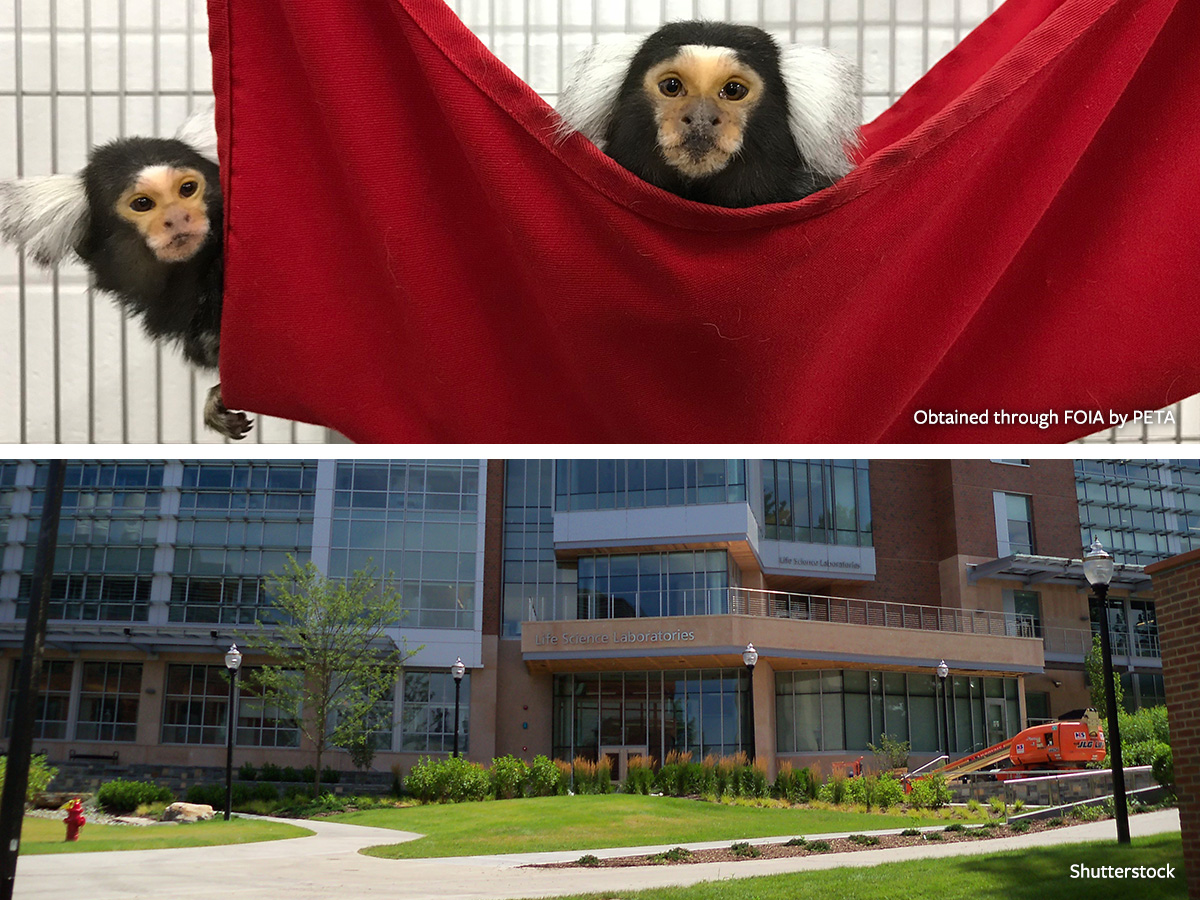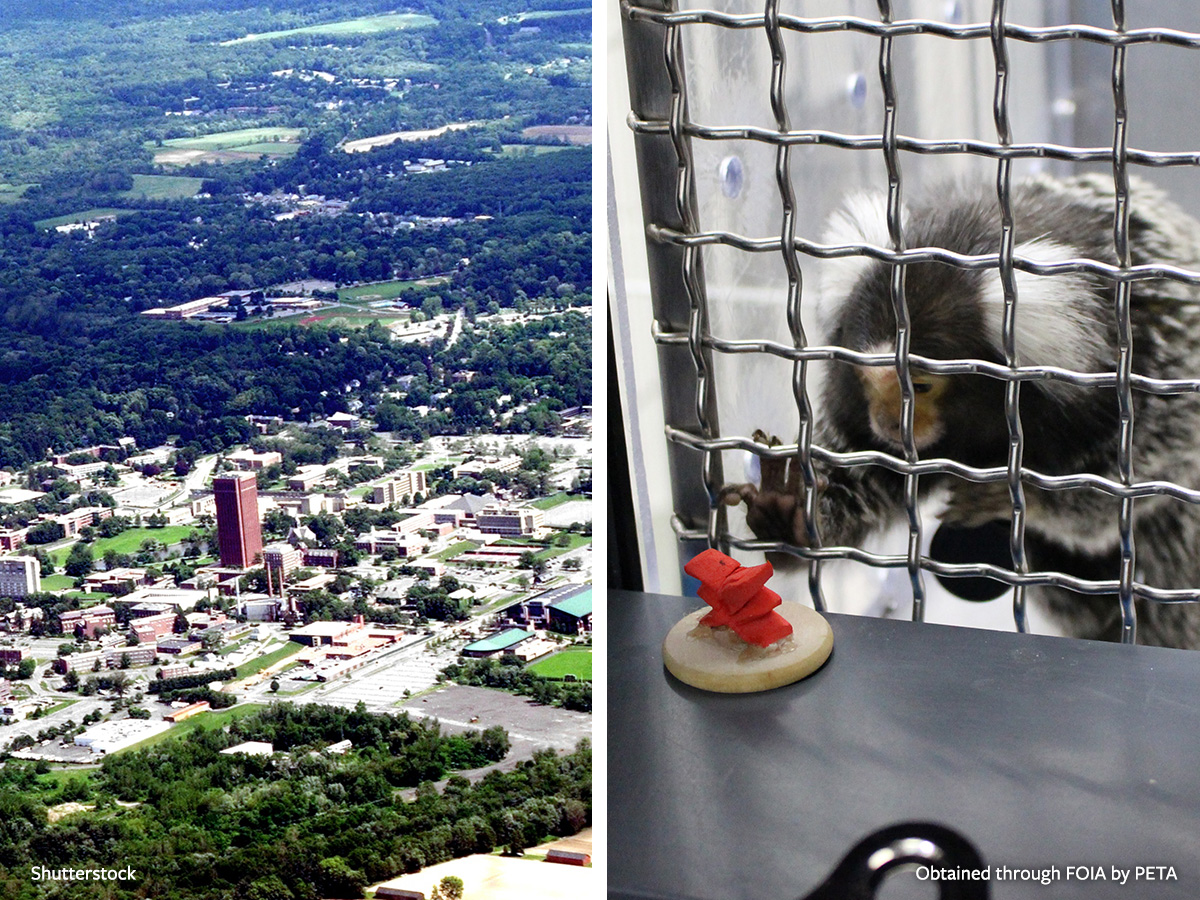Bittersweet Victory for Marmosets at the University of Massachusetts
We have achieved a victory that is both exhilarating and devastating. Alongside our allies, we fought tirelessly to shut down the University of Massachusetts Amherst’s cruel marmoset experiments led by vivisector Agnes Lacreuse. Today, we can say that her monkey colony is no more, her funding appears to have dried up, and her laboratory has closed.
But our joy is tempered by grief.
According to new reports, every remaining monkey in Lacreuse’s lab, that’s over 60 marmosets, has been killed. Their lives were ended, not because they were beyond help, but because their abuser’s real goal was to examine their dead brains. This grisly outcome was outlined in her own grant proposals.

For years, these gentle monkeys endured procedures that no compassionate person could condone. In the name of “menopause research,” Lacreuse deprived them of sleep, restrained them for hours, blasted them with loud noises, injected them with hormones, and subjected them to repeated brain scans. These tests were designed to induce stress, confusion, and hormonal changes, all while tearing the animals from the comfort of their companions and natural environment.
The cruelty was matched only by the uselessness of the research. Marmosets are small New World monkeys whose physiology and aging processes differ greatly from humans. Menopause in humans is a uniquely complex biological and social experience, shaped by factors that can’t be replicated in another species, much less in a sterile laboratory. No matter how much suffering Lacreuse inflicted, her data could never produce meaningful treatments for human menopause. Decades of such experiments have failed to yield any medical breakthroughs, while proven, human-relevant methods exist. These methods include advanced imaging, organ-on-a-chip technology, and large-scale clinical studies.
“The marmoset lab at UMass Amherst has closed. Caring for nonhuman primates requires top-quality infrastructure and resources that are very costly. I am very grateful that the National Institutes of Health (NIH) recognized the importance of our work and funded our research on aging, Alzheimer’s disease, and women’s health for many years. However, current efforts to destroy science and slash research funding undermine my ability to provide continued support for nonhuman primate research at UMass. As we are completing a large study to help women with breast cancer live a better life, I have taken the decision to no longer seek funding to support a marmoset colony at UMass. I deeply thank the many undergraduate students, graduate students, postdocs, animal care staff, technical staff, veterinarians, colleagues, and administrators who made this research possible. Above all, my heart goes to each one of the beloved monkeys who helped advance scientific knowledge and improved the lives of humans and other animals.” – Agnes Lacreuse, Ph.D.
Isn't it rich that she blamed the end of her laboratory on “efforts to destroy science”? The only thing she destroyed was common sense and hundreds of marmoset lives. Her so-called research was scientifically bankrupt from the start because marmosets don’t go through menopause, yet she glued hand warmers to them to mimic hot flashes. That’s not innovation, that’s absurdity masquerading as “science.” Now, with the lab closed and funding evaporated, it’s clear what really happened: real science prevailed over pseudo-science.

Our work with other organizations, from on-campus protests during World Week for Animals in Laboratories to sustained public pressure campaigns, helped turn the tide. Whether from mounting ethical condemnation or a lack of future funding, Lacreuse has shut the doors of her primate lab. For the monkeys who should have been retired to sanctuaries, freedom came only in the form of death.
While the lab’s closure marks a major win for animal advocacy, it also demonstrates why our fight is far from over. No animal should ever be tortured for an experiment that was doomed to fail from the start. We will continue to demand that universities and funding agencies replace these archaic, cruel practices with modern, humane science that actually helps people without destroying lives.
To the marmosets who suffered and died in Amherst: We honor you, and we will not forget you. We are deeply grateful to every supporter who protested in person, made calls, posted comments on social media, signed and shared our alert, and otherwise spoke out against these cruel experiments. Your voices were part of the pressure that helped end this lab’s operations, proving once again that when we stand together, we can create real change for animals.
Please take a moment to learn more about what we do and consider supporting our work on this issue.




